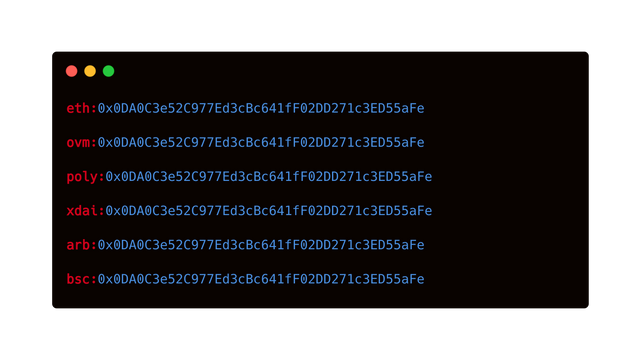EIP3770 - Chain-specific addresses
# Abstract
This EIP introduced a new address standard to be adapted by wallets and dApps to display chain-specific addresses by mapping human-readable names to CAIP-3 (opens new window) blockchain IDs.
# Motivation
The need for this EIP emerges from the increasing adoption of non-Ethereum Mainnet chains that use the Ethereum Virtual Machine (EVM). In this context, addresses become ambiguous, as the same address may refer to an EOA on chain X or a smart contract on chain Y. This will eventually lead to Ethereum users losing funds due to human error. For example, users sending funds to a smart contract wallet address which was not deployed on a particular chain.
CAIP-10 (opens new window) introduces an account identifier that encodes a CAIP-2 (opens new window) blockchain ID as part of the address. For EVM-based chains, these blockchain IDs are defined in CAIP-3 and leverage EIP-155 (opens new window) chainIDs. However, CAIP-10 targets developers, not end-users. These account identifiers are not meant to be displayed to users in dApps or wallets, and they were optimized for developer interoperability, rather than human readability.
To solve the initial problem of user-facing addresses being ambiguous in a multichain context, we need to extend CAIP-10 with a user-facing format of displaying these account identifiers.
# Specification
This EIP extends CAIP-10 with a standard for mapping EVM-based blockchain IDs (CAIP-3) to a human-readable blockchain short name, as defined in ethereum-lists/chains (opens new window).
# Syntax
A chain-specific address is prefixed with a chain shortName, separated with a colon sign (😃.
Chain-specific address = "shortName" ":" "address"
shortName= STRINGaddress= STRING
# Semantics
shortName is mandatory and MUST be a valid short name from ethereum-lists/chains (opens new window)
address is mandatory and MUST be a EIP-55 compatible hexadecimal address
# Examples

# Resolution Method
Chain-specific addresses are resolved to CAIP-10 account identifiers using ethereum-lists/chains (opens new window):
| EIP-3770 chain-specific address | CAIP-10 account identifier |
|---|---|
| eth:0x0DA0C3e52C977Ed3cBc641fF02DD271c3ED55aFe | eip155:1:0x0DA0C3e52C977Ed3cBc641fF02DD271c3ED55aFe |
| ovm:0x0DA0C3e52C977Ed3cBc641fF02DD271c3ED55aFe | eip155:10:0x0DA0C3e52C977Ed3cBc641fF02DD271c3ED55aFe |
| poly:0x0DA0C3e52C977Ed3cBc641fF02DD271c3ED55aFe | eip155:137:0x0DA0C3e52C977Ed3cBc641fF02DD271c3ED55aFe |
# Rationale
CAIP-10 account identifiers are not suitable for user-facing addresses that are chain-specific as they are non-human-readable. However, CAIP-10 identifiers are still the preferred option for development purposes, as they are ecosystem-agnostic and work best with chain-splits. As a result, this EIP aims to bridge the benefits of human-readable chain identifiers with the benefits of CAIP-10.
# Copyright
Copyright and related rights waived via CC0 (opens new window).